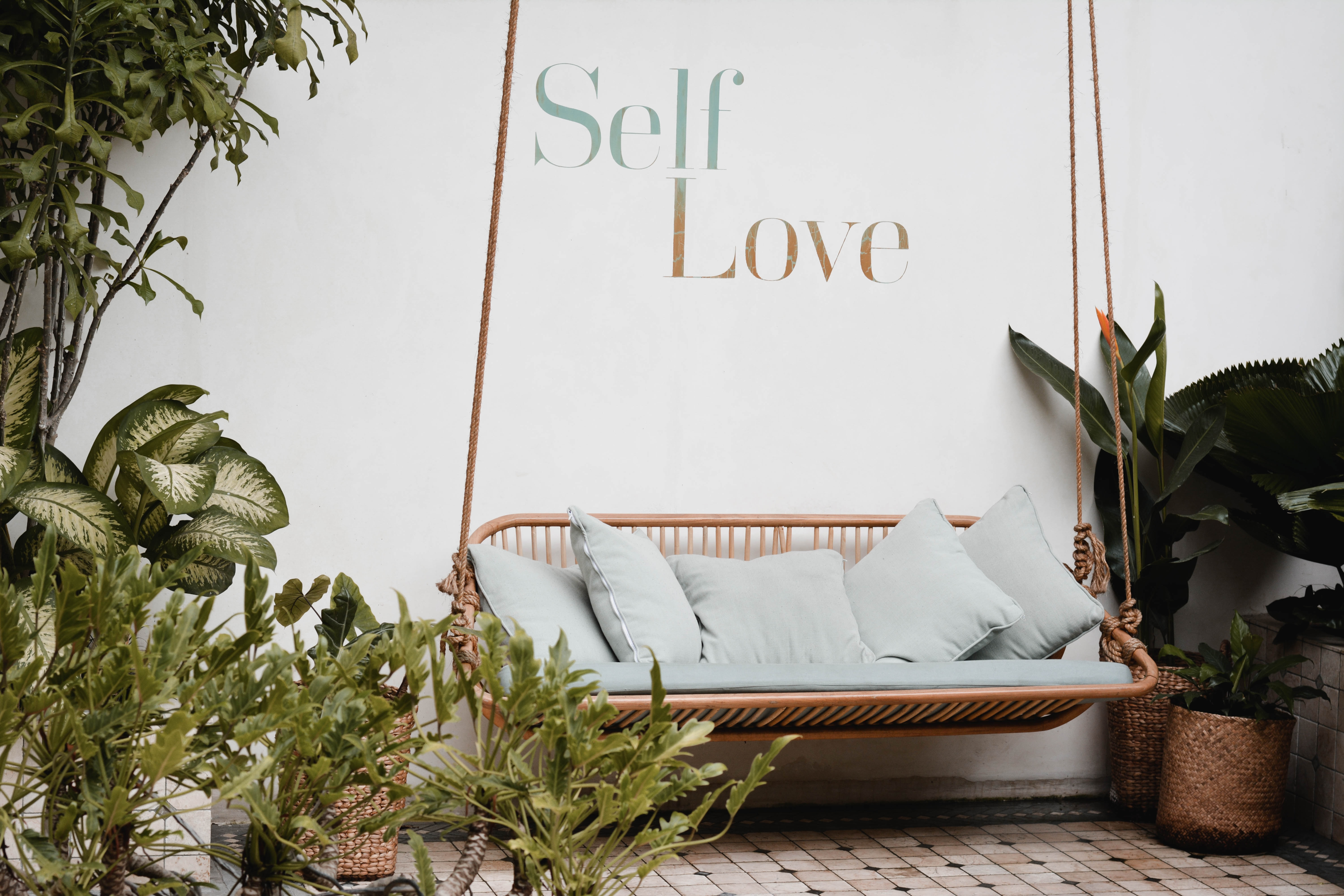how to love yourself – 10 ways to inner happiness

Looking around at other beautiful, successful women, seeing them achieve big things I couldn’t, go to places I hadn’t been, and smile deeply and authentically in ways I hadn’t, I wondered: how do they do it? In this article, we will explore how to love yourself and uncover the secrets behind their self-confidence, personal fulfillment, and genuine happiness.
Discover empowering techniques and practical advice to embrace self-love and unlock your own path to success and inner contentment.
Table of contents
Put a little self-love into your life!
How have they got it all together, achieving things I couldn’t even dream of? Why are they so happy? Why can’t I feel like this?
But that’s where I was wrong. I could feel this way. I could achieve big things and go to places I thought I couldn’t. They don’t have it all together. They’re not free of the creeping self-doubt that plagues me.
My problem is not that I can’t, as I’d spent years convincing myself; my problem was the narrative I was telling myself. Can’t is so damming; I’d condemned myself to a life of self-hate. How could I expect to be the successful, beautiful person who ‘has it all together’ if I’m telling myself I can’t be, before I’d really tried?
I didn’t truly appreciate myself for who I was, or the gifts I could contribute to the world. Instead, I was stuck in a cycle of comparison and self-loathing. And I couldn’t get out.
“You just have to love yourself,” they said. “Stop being so hard on yourself. Show yourself some love”. The issue then was that the love-yourself advice that I was hearing thrown about all the time, I wasn’t buying either. I’d tried writing a letter to myself, telling myself how wonderful I was.
I’d tried the whole standing in the mirror and telling myself I was beautiful, hoping to magically see a Beyonce-like vision appear in front of my eyes as I finally embraced all the flaws I’d picked apart. It didn’t happen. I’d tried the affirmations, telling myself I can do things, that I was deserving of my own love. I’d even tried the simple ‘self-care’ evenings with a therapeutic bath, some online shopping, and an early night. It didn’t work.
I didn’t wake up the next morning feeling any better. In fact, I actually felt worse because I was guilty of indulging in some unnecessary me-time when I had so much to do. I dismissed it all. Self-love couldn’t work for me. My self-esteem was too low. I just don’t love myself – and it’s as simple as that!
Self-love is so much more complex than just deciding to love yourself with a couple of extra self-care practices or some meaningless statements. Self-love is no quick fix; it’s anything but easy. You have to really believe the words you affirm, really feel what you’re telling yourself you feel, really see your value and your worth.
And even now, in my mid-20s, writing this article, I’ve not nailed it. I’m still learning, and I still struggle with truly loving myself. But now I’ve come to accept that it’s a journey; it’s not the destination that I was imagining when I compared myself to the women who ‘had it all together’, and didn’t have anything left to worry about.
Maybe, I realized, just maybe, the path begins with one small step. And that is finding some way of simply accepting yourself for who you are. Simple acceptance. Then leaning into that acceptance and finding some room to love.

What is self-love?
If we believe everything we see on Instagram, the self-care practices in the name of self-love, it’s very easy to see self-love as nothing deep. An indulgent bath? Pressing pause on all my other demands while I treat myself? It’s somewhat reductive, and sounds a little superficial, if not overly self-indulgent.
Alternatively, self-love is often depicted as a fairy-tale bliss-like state, in which everything is perfect and, in such a dreamy bliss, it’s then that we’ll just know that we’ve finally reached the self-love goal post, and everyone else will love us too. Like a big sigh of relief. Self-love?
Ticked that one off! Because what’s not to love about perfection? But that’s where we’ve misunderstood what it means to love yourself. It is neither navel-gazing nor selfish, nor does it come with the pre-requisite of being perfect, nor is it a destination that once you’ve reached, it’s all done.
Perfectionism, in itself, prevents love and appreciation – how can I love what’s not yet perfectly loveable? – and adds a whole other pressure to something that should be freeing, liberating for self. And the idea of a finishing line adds a condition to when you are allowed to love yourself. None of these are what loving yourself is supposed to entail.
Acceptance is the key: You don’t have to love your reality to love and accept yourself
Instead, at the root of self-love is self-acceptance. Accepting yourself for exactly who you are and where you’re at. The presence of acceptance doesn’t necessarily mean liking your current circumstances, nor does it mean abandoning the desire to change or the motivation to do things differently.
In fact, change in the light of acceptance is a beautiful thing. It means allowing yourself to go through all the stages of change, the stages when you’re not quite there, without the criticism that keeps you from progressing and moving into that place in the first place.
Acceptance simply means freedom from judgment of self, it means no room for comparing yourself and feeling like you’re not good enough, it means removing the confines of criteria that need to be met to accept and be accepted, it means not being critical of yourself for mistakes or difficult times.
Self-love is not constant nor permanent. It is ever-changing, and you can expect some days to be better than others.
Some may feel like you’re struggling to feel any kind of love, but that’s when you have to allow the kind, accepting voice inside of you to speak, and to speak louder than the negative thoughts, the guilt, shame or hatred.
Acceptance is forgiving, it’s kind, it’s unconditional, and it means believing that you are enough just as you are. Accepting that you are worthy of acceptance.
That’s why I truly believe that the path to self-love begins with welcoming self-acceptance, and accepting that you are worthy of it.
Maybe striving for self-love is too much, especially at first, if you’re in a similar place to me, thinking it simply can’t change a thing for you. Instead, acceptance lowers the level of expectation of the feelings that we’re told should happen, the falling in love with yourself, the loving every flaw, and everything about your life. Not realistic.
So often, our suffering comes from longing for things to be different, including things that cannot possibly change even if we tried. We berate ourselves for it, we self blame for everything that we wish was different, we feel disappointed in ourselves, and the disappointment often turns into the belief that we are the disappointment.
Acceptance allows us to move through the resistance to ourselves, past the things we can’t control, around the denial of how things really are, beyond how you think you should be, what you should do, what you could have if things were different and into appreciating that this is how things are, this is where I’m at, this is who I am, this is what I can change, this is what I can learn from, and this is where I hope to be.
So that we can simultaneously accept ourselves, and accept the growth that we can see room for. As I mentioned earlier, self-love and acceptance are not synonymous with resistance to self-development. They’re the very things that fuel it, but instead of coming from a self-critical perspective, they arise in the freedom of a positive frame of mind.
Steps to self-love

So, if the first step is simple, unconditional acceptance, let’s look at some other tangible things we can all do to step into the beautiful realm of loving ourselves.
Stop the comparison!
I should begin my first tip by correcting the mistake I made when I started this article. Stop the comparison to others. Comparison is truly the thief of all joy and the root of a lot of negative self-talk. Ask yourself where the thoughts are coming from.
Maybe social media posts, like filtered pictures, make you feel like your life pales compared to others’ and therefore you’re less worthy. It’s no surprise that you feel such low self-worth. Or that your body is not beautiful, never will be, and that nobody else can find you attractive. It’s no surprise that your self-esteem is so low.
Asking yourself, “Where is my story coming from?” and “Is this really true?” will help you realize these stories you tell yourself are not facts.
Instead of focusing on what others have and what you don’t, or what others are doing that you’re not, focus on watering your own flowers, so that they can blossom, and you’ll realize that you can be and you can have the things you once told yourself you couldn’t have or be.
In fact, you’ll probably realize that you already have them, you already are them, and that you have a lot to be grateful for in your own garden of flowers!
There’s a lack of self-respect that comes from comparison and often a blame of self for another person’s win, when really, it’s completely out of your control. Their achievements don’t ever lower your worth. Instead, practice happiness for others, even when things don’t go your way, and stay focused on your own garden. Happiness for others generates more happiness for them, but also joy for you too. It’s a ripple effect of happiness all round.
And instead of bringing you down into a pit of wallowing, or preventing you from getting to the places to which you aspire, compassion for yourself in these circumstances, instead of harsh criticism and hateful narratives against yourself that do nothing but cause self-inflicted wounds, will open up such opportunities and help you see the growth you need to get there or simply the fact that you can get there or are already there.
Stopping the comparison, then, is an essential part of changing the negative self-talk. How you talk to yourself matters.
The words you speak become the house you live in; the perspective you speak over yourself and your life has the power to change everything.
This brings me to my next tip:
Challenge your inner narrative!
We have a constant, ongoing dialogue with ourselves that either facilitates or hinders our self-love. Buddhists teach a parable about suffering that is invaluable in our understanding of the journey to self-love.
The story goes that a person is hit by an arrow, causing great pain. Then they’re hit by a second arrow, causing even more pain. The first arrow represents suffering or unfortunate events that happen to us.
The second arrow is our reaction to the first – the story we tell ourselves about the first event. The first arrow? Out of our control. The Second? Our emotions, our thoughts, the dialogues of what should or shouldn’t have been, and who we tell ourselves we are as a result of the first arrow – self-inflicted and completely within our control. In fact, the story we tell ourselves, the second arrow, is often the main source of our sadness.
Self-love means not shooting ourselves with the second arrow, the arrow that often turns one situation either into something unrelated or something worse. It doesn’t mean denying our feelings or our reaction to the first arrow, nor does it mean we must become immune to suffering.
It means feeling the feelings, but becoming aware of our choice about how to proceed, and choosing not to throw endless arrows at ourselves with a negative inner dialogue. Don’t let your hurtful words cause a drought in your blooming garden. Don’t prolong the pain.
When you find yourself in a situation of suffering again, try asking yourself, “Am I still suffering from the pain of the first arrow, or is it the second arrow that’s hurting me now?”. It might help you see how to be free from extra pain and protect your emotional health more than your usual story.
Observe your thoughts, but don’t believe them

In other words, our inner narrative can be destructive, painful, a weapon we use against ourselves. If we’re constantly telling ourselves that we can’t do things, that we’re no good, not worthy, or that we cause problems, we’re continually injuring ourselves with extra arrows.
Here’s an example to consider: you lost your job – this is the first arrow. It’s very easy to then tell yourself it happened because you’re no good at it, that you always mess things up, that there were so many things you should’ve done differently, mistakes you shouldn’t have made, things you didn’t say that you should’ve said, and to focus on past mistakes.
Endless shots fired at yourself with second, third, fourth… hundreds, even thousands, of arrows. It one of our coping strategies, to look for somebody to blame for everything that we consider to have gone wrong. In this case, blaming ourself is neither productive nor positive; it just makes us feel bad, worse than the situation itself makes us feel.
But the first thing to realize, and a key to protecting ourselves from the subsequent arrows that are fired, is that we are not the voice of our mind, we are not who our thoughts tell us we are.
We simply hear the mind. We are observers of our mind. So sit with the emotions that arise, observe them, but also realize that the way you talk to yourself is not who you are. If you need to, even say out loud to yourself during these moments, “This is not who I am,” and say it for as long as you need to, to free your mind.
The second thing to realize, therefore, is that we have the power to change the way we see ourselves via our inner narrative. We can transform it into a more loving and accepting story of self. Simply by changing our internal dialogue, we can feed love and compassion.
Stick to the facts
Returning to the example scenario, then, reconsider who you tell yourself you are as a result of your situation and remind yourself of the facts, keeping in mind that you are not your thoughts.
Your worth does not change because of a job. You are still skilled, you are still talented, you still deserve to enjoy a fulfilling career, you will be able to find the one for you, and most of all, you are still loved and worthy of love, whether you work or not.
Think in terms of the facts rather than in the ruminating that we often resort to. This will help you manage stress that naturally arises in situations like these. Maybe it happened because there were circumstances outside of your control that affected you and your performance. Perhaps it’s because you’ll realize that it will serve as a valuable life lesson.
Maybe it’s simply because it wasn’t the right position for you, and better things are coming your way. In this example, it doesn’t necessarily mean denying your role in losing the job, or refusing to accept some kind of responsibility, if that was indeed the case, it means viewing it in a more positive light.
Being able to accept and say “okay, these are the facts of what’s happened”, and not berate or give yourself yet more reason to criticise. Being able to reframe it in your mind as something that you can only learn and grow from. A message from the universe that it wasn’t the right thing for you.
Something that opens the door to another position that will create a lasting feeling of fulfillment.
Whatever the story, whatever you tell yourself, you’ll believe that narrative. So make your truth factual and, most importantly, kind.
Start a practice of loving affirmations to turn positive thoughts into your default

Affirmations are one way to help transform your critical inner dialogue and allow you, instead, to remind yourself daily of all the wonderful things you can, and do, love about yourself. Since the way we speak to ourselves creates the house we live in, and feeds the untruths we believe about ourselves, it’s important to try and change the unhelpful core beliefs at the root, the framework, or the foundations, of our house, and fill it instead with healthy beliefs and positivity.
If we dedicate the time to a conscious practice of affirmations, we can lead the subconscious away from the negative energy and rewire our neural pathways to a natural default that is more self-assured and more compassionate.
This leaves less room for the damaging core beliefs to take hold, talk us out of exciting opportunities, or hold us back from reaching our true potential. It’s a little like brain training, speaking out loud the truths that we want to lead our minds to accept, believe, and really embody.
So that our response to anything that happens is a feeling of worthiness and compassion. This will also tell the universe that this is the energy and the life that we accept for ourselves, as we radiate love and positivity.
I’ve put together an article with over 70 different ideas of affirmations you can start telling yourself on a daily basis, no matter what stage you’re at or where you feel you need specific work. You could also try affirming inspirational quotes that motivate you, help remind you what’s special about yourself or confirm things you’d like for your own life. Affirmations done daily, in whatever capacity, will help you reach a place of inner peace, and contentment with yourself and everything you are.
Place no limitations on your emotions

Allowing yourself to feel pain, and to feel joy, to feel both extremes and all the emotions in between in equal amounts, whenever they arise, is so important for helping you understand yourself better – and learning how to love yourself starts with learning about yourself.
Putting limitations on how you can and can’t feel, or how you should and shouldn’t feel according to your inner narrative, doesn’t allow you to process your reaction to life’s events. It does nothing but suppress and hold emotions in, until eventually they erupt and you end up expressing them in a way that hinders, rather than helps, your ability to reach your goals.
What you resist, only persists. Emotional intelligence means honouring what you feel and allowing yourself to experience it fully for what it is. Only then can you experience the release and the lift, the lighter feeling that comes with having truly felt.
Feeling all the things you feel in full is therefore an important part of fostering a healthy emotional well being and a positive psychology of knowing that, although you may feel all these things, and sometimes they may feel awful, and other times they may feel incredible, you are not your feelings. Like I said before, you are simply an observer of them.
Spend time reminding yourself of this to help you process what’s going on in your mind with a kinder approach and be able to separate what’s going on up there, with yourself and who you are.
Feeling everything also allows you to be truly present. Life is full of distractions, things that cause us anxiety and fears about our future. If we’re constantly spending time focused on the future, the “when this happens, then…”, this doesn’t lead to happiness and prevents you from really living.
Instead, if you experience every moment of life, and all the things that these moments make you feel, it will reassure you with the knowledge that life really is special, incredible in fact. It makes the prospect of a longer life, more life to live, even more exciting.
Practice gratitude

Closely linked to a newfound appreciation for life, and for yourself, is a practice of gratitude. A lack of self-love and low self-esteem often means that it’s difficult to be pleased with yourself for anything, or to notice the good things that happen to you. It also means that it’s hard to feel like good things should happen to you, since low self-esteem is so closely tied to feelings of unworthiness and not being deserving of good things.
But this is exactly when it’s time to look within and tap into that sense of pride and joy that lies within all of us. It’s time to turn to gratitude.
Also read >>> Why do yogis love Brené Brown so much?
A daily dose of gratitude reminds us of our value
Gratitude is one way to help cure your low self-worth, because it makes you consciously and intentionally look for the things that go well for you, the things that other people do for you and the ways that life is good to you every day! In this way, as you open your eyes to what’s good in your own life, it naturally leads to less comparison with others.
You’ll feel less of a need to look at what everyone else has, or the places they’re going, because you’ll realize all the good things are happening to you, in your own life. You’ll see that there is no lack, no ‘not good enough’ in your own life, because things are good in many different ways.
Yes, others have great things going on, but so do you! I needed my own advice at the beginning of this article! You’ll also develop more of a realistic and grounded sense of your own value because, as you see how life, and other people, are good to you, you’ll realize too, that you are deserving – there’s a reason people are good to you.
Gratitude is good for healthy relationships
In this way, gratitude strengthens relationships. It helps us more easily identify the positive attributes of our partner, friends and family members, the things that make us grateful for our relationships to them.
And with the gratitude attitude, we’re noticing more of the things we love about them, we’re appreciating the good things they do for us, we’re acting more in ways that show our gratitude, and so naturally, we’re more positive people, a greater joy to be around.
Gratitude is good for physical and mental health

Gratitude also improves physical and mental well-being and is linked to reducing stress, anxiety, and depression. In terms of physical health, it can reduce blood pressure and the risk of heart disease, thanks to its calming effect.
It’s also been shown to improve sleep – focusing on what we are grateful for, or what went well each day, instead of what we don’t have and all the ruminating, negative thoughts (like what we should be doing to change our lack, or what we should’ve done differently during the day) that then spiral in our heads as we lay in bed, helps the brain enter into a more relaxed state.
Finally, as for our mental health, there’s positive psychology to gratitude. It’s a refreshingly positive emotion. It reminds us of all that we’re grateful for and therefore creates a general feeling of happiness, contentment with life, and hope that good things can keep happening.
When we can internalize the love and happiness that comes with it, we can stop internalizing symptoms of a variety of mental health issues, including anxiety and depression, and believe in ourselves and our ability to more easily deal with life’s difficulties because we’ll know now that they don’t last!
It’s fair to say we’re grateful for gratitude and all that it can do for us!
View your situation from the perspective of your loved ones
Another way to challenge the critical inner narrative is to think of how somebody else might view your circumstances. To speak kindly to yourself, with more compassion and more positivity, treat yourself how you would treat a close friend, a family member you love, or even just an outsider.
What is so funny about us is that we treat ourselves completely differently to how we treat everybody else.
The most important relationship we have in our whole lives, the only one that is guaranteed forever, is the one with ourselves. Yet, it’s our human nature to find it so much easier to treat our mums, our best friends, and our partners with more love than we feel able to show ourselves.
We spend more time working on other relationships in our lives than on our relationship with ourself.
We would easily reassure our friends when things aren’t going well for them, remind our mum just how much we love her, send texts to our girlfriends to find out if they’re okay, complement our partner when they’re looking good, or encourage a colleague to aim for a big promotion, but in those same situations, we’d tell ourselves we won’t get it, or we’d think of the things we don’t like about ourselves, remind ourselves of our limitations, we’d beat ourselves up for feeling a certain way, forget to check in on how we’re really doing, never compliment ourselves or do the things to help us feel good in our bodies.
Self-love can be as simple as thinking about the things you do for others that you’d love for somebody to do for you and doing them for yourself. So if you like surprising people with a little gift, complementing your friends to make them feel good, or sending a little encouragement message before they’ve got an important event, texting people to check in and make sure they’re okay, or telling your partner it’s okay to rest and do something they enjoy after a bad day, do exactly that for yourself.
Some things might feel silly at first, but stick with it. Love for ourselves isn’t, and shouldn’t ever be, any different from the love we give others and what we feel they deserve.
Forgive yourself

Forgiving yourself is another way to release the tight limits you set in your brain of how you should be or what you should or shouldn’t do, where you should or shouldn’t be in your life, and move into a place of unconditional acceptance of your whole self. It’s a similar idea to my previous tip in the sense that you can think again of how somebody else would view your situation.
It’s more often than not that you’d be able to forgive somebody if they made a mistake or did something they regretted and were sorry for, so in the same way, self-forgiveness is a practice that can foster acceptance and love.
One way to make this easier to do is to identify what you’ve learned from a difficult situation or a mistake and take that forward with you so that if a similar thing happens again, you know how to respond better, you can see more productive ways to deal with the situation, or you can avoid making the same mistake or getting into the same problem again.
Remember, love and acceptance of self do not mean that we won’t make mistakes, nor do they preclude us from needing to apologize for our mistakes. They don’t make us perfect. But what they do, is allow us to move on, move forward more easily, with a lighter conscience, and be able to let go of the situation so that it doesn’t become a weight we carry and one more reason to keep perpetuating self-hate.
Keep your promises, honor your word
One aspect of self-love that is closely related is self-trust. We constantly look for evidence that we can trust ourselves and, therefore, that we can do the things we hope to do.
Self-trust builds confidence, reduces the anxiety you feel around decision-making, and it allows you to more freely listen to what your inner voice, your intuition, is honestly saying. In this way, it’s easier to make decisions that you feel confident in – it doesn’t necessarily mean that you’ll always make the right decision, but it means that you’ll make decisions that you can wholeheartedly stand behind.
Confidence simply means that you trust your word.
The evidence that we can trust ourselves comes partly from keeping our own promises to ourselves. It’s very easy to break our promises to ourselves because there’s nobody to hold us accountable, there’s no urgency, and there are no consequences in the traditional way you’d think of them.
But really, there are. Your word is your bond, and when we repeatedly break a contract we make with ourselves, we internalize feelings of disappointment, distrust, and frustration. The disappointment becomes I am a disappointment. We realize we’re not important.
The things that motivate us to keep a promise with somebody else, like the negative feelings we want to avoid them experiencing, the disappointment we don’t want them to feel in us, the reputation, credibility, and integrity we don’t want to lose, all seem to go out the window when it comes to our promises.
So if you say that you will start dedicating a little time to taking care of your needs each day, do it. Or if you say that you’ll get up earlier tomorrow to be more productive, try doing it.
Or if you say you’re going to try something new to push you out of your comfort zone, like signing up for a new class or speaking during an office meeting, do it. In each of the situations, you’ll either cultivate a closer and more nurturing relationship with yourself; you’ll have proven you can listen to your inner voice and honor your needs, or you’ll have tried a small act of bravery that’ll help you realize that fear is never as big or bad as you made it in your head and you’ll probably have found joy at the other side.
In all cases, you’ll have shown yourself that you’re trustworthy, that you can follow through with your own word, and simply, that you care. And that’s empowering!
The reason these are so important is because they’re the values that we hold dear, values we strive to embody, and values we look for in other people and relationships. As you keep more promises, you’ll build momentum over time, even with the tiny ones that seemingly don’t matter all that much. They all impact our level of self-trust.
Also, Read >>> Learning to love the body in sickness and in health
Promises don’t create new conditions on which we can love ourselves
But don’t let the promises become a condition on which to accept yourself. It’s not a case of when you lose the weight, or when you find the perfect relationship, or when you get the killer promotion, then you’ll finally feel happy.
This comes back to realizing that self-love is not a destination, not a place that you will arrive at and everything will fall into place. It comes when you can learn to let go of the need to feel happy about everything all the time, and accept and actually, appreciate, the ups and downs that come with life, knowing that you can come out the other side a little better than before, with new wisdom, new skills, or new people who support you.
Take good care of your body
Looking after your body is as much a part of loving yourself as any of my other tips. In fact self-love is taking care of yourself in every way. That’s every aspect of your mental and physical well being that affects the way you see yourself and therefore, your ability to love yourself.
Prioritize your physical health

Exercise is not just a means of ‘fixing’ things we’d like to change about ourselves physically, it is truly a form of self-care in every sense – it keeps us feeling healthy, it affects our mood, the way we view our body, the way we manage stress, the way we view our limits and our ability to overcome them, setting and achieving goals and it promotes commitment and motivation, which we can translate into other areas of self-love, like honoring our promises to self.
Remember, exercise doesn’t have to be yet another way to punish ourselves with a gruelling routine, nor should it be more fuel for the inner critic. In fact, it’s simply none of those things. If we view it like that, we’ll never want to do it; it’ll become a chore.
See it instead with healthy eyes, as the gift that it truly is to ourselves: time away from a busy life, to focus on ourselves and do some form of movement, and getting into our flow, for enjoyment not pain.
That might be a walk through the park, a fun dance class with others, a mindful yoga class for stretching the body or a hike through nature. You can read more about the psychological benefits of yoga here, and also about how the principles of yoga can benefit our spiritual and emotional well-being. And without thinking about it, you’ll have done something to help prevent disease, help you get enough sleep and ultimately, live a longer life.
So take the time to do whatever movement is your kind of movement. There is no right or wrong, but when you find what it is that you truly enjoy, it’ll become a happy hobby. This helps get your body into a state of ‘flow’, which happens when we do something we enjoy and improves feelings of confidence and happiness.
The more you can get into that state, the better. Exercise is not merely a key element of physical self-care but a way to promote health in every area; movement is magic!
Allowing yourself to get enough sleep is also a part of good health and physical self-care, to support you to show up as your best self in your daily life. When we feel tired and sluggish, we tend to feel much worse about ourselves and our zest for life disappears.
It’s okay to go to bed early and rest, if that’s what your body needs, or to skip doing the dishes if you’re feeling exhausted. We’re all human; we need a break! Don’t put it through more suffering if it’s needing your attention and love. Resting will help you feel rejuvenated and much better in your body.
Finally, nourish your body! Eating well is vital for optimum mental and physical well being.
Take care of your mental health
In terms of looking after our mind, it’s all about being mindful. Mindfulness means being present, aware of what’s going on around us and within us, and removing judgment. It allows us to connect with everything we experience, both internally and our external stimulation.
Meditation is a great tool for emotional self-care and incorporating a practice of mindfulness into daily life. It won’t solve your issues, but it will help you keep more in tune with your feelings and your body, what you desire, and what arises when you allow feelings to flow.
When you look inside, you learn what you need and how to better support yourself. Follow your breath, and allow yourself a few minutes to just breathe.
This will help you re-focus and re-center your attention to what’s true, and what matters. And the only real truth is the present moment.
You could say it’s a little like spiritual self care, learning from ourselves what we need to protect our spirits.
Try limiting time on social media, even try going screen-free for some time each day. It’ll help you stop the comparison that does nothing but internalise a harsh narrative about yourself.
Embrace happiness

Maybe one of the most important tips is to truly embrace happiness. Your authentic self is your happy self. Pessimism and negativity only come from years of conditioning our minds with messages from society, other people and our own self that we don’t deserve to be happy, or any of the other critical self-talk I began the article with. Whatever the source, we’re indoctrinated to believe we can’t be happy.
But whatever season you’re in in your life, it can be a happy one. Don’t overthink it, simply let it flow. Let go of the overthinking; if you feel happy about something, big or small, be happy, lean into it.
If that means doing more of the things you love, because they make you happy, prioritize that. If that means surrounding yourself with positive people who encourage you, who are dreamers and fuel your dreams, or who simply have a happy, optimistic outlook on life, make that change and it’ll rub off on you.
There’s simply no excuse to not do things that bring you joy. It’s just that we’ve come to believe that healing must be painful, difficult and that if it doesn’t challenge you, then you’re doing it wrong – you mustn’t really be healing.
Happiness is always deserved
But healing can be blissful. If you don’t feel worthy of the bliss, or of happiness, come back to my first point, unconditional self-acceptance. Accept that you dodeserve to be happy and enjoy the happiness you’re experiencing.
After all, this is why you’re reading this article, this is why we are all striving to discover the contentment that comes with loving ourselves.
So why do we resist happiness when it comes? Simply observe the sense of unworthiness or un-deservingness, if it comes up. Then affirm that you are worthy, remind yourself that this is what you wanted, and that this is what other people would want for you, too. Remember, your friends would be happy about your happiness, and this creates the beautiful ripple of joy I spoke about before.
Practice setting boundaries to show yourself respect
On the same note, if it doesn’t make you happy, don’t do it. Practice setting boundaries. Self-love is about recognizing our needs, taking care of them and honoring them for ourselves, not for anybody else. You might not see it yet, but this is just as much about kindness and self-respect, as speaking kindly to ourselves in difficult times, for example.
So if you need to tell somebody “no” because it’s right for you to do that, say “no”. Or if you need to keep away from certain people because they’re draining your energy, that’s okay too.
Or if somebody’s negativity is damaging to your emotions, it’s okay to say kindly that you don’t want to grab coffee to protect your emotional health. Or if you simply don’t want to go to the party because you’re not feeling good about yourself, and you can recognize that you need some ‘me’ time, that’s great.
It’s wonderful to be in a place where you can spot those things, and drawing your boundaries is precisely what you should do to prioritize your emotional self-care. After all, you can’t pour from an empty cup, so if you take the time you need to focus on yourself and fill up your cup first, you’ll have enough to share with others around you.
And when you do feel like grabbing coffee with a friend or going to the party and having fun, you’ll recognize it and be able to honor it – and it’ll feel so much more enjoyable, in a better place of inner contentment because you’ll be able to show up with your whole, authentic, happy self.
Ask for help

Practicing self-love might initially feel unnatural, which might be a source of resistance. If you can’t move past the resistance or don’t know how best to incorporate strategies to improve things, talking to a licensed clinical psychologist might be a good place to start.
A licensed psychologist can help you create strategies for improving your mental health. You can learn to make effective, positive changes that last thanks to therapy.
Remember, self-care doesn’t mean you have to do it all alone; in fact, the very act of caring for yourself means recognizing when you need help and being able to use your voice to speak up and ask for it without feeling embarrassed or shameful.
Self-love is one of the most important and rewarding practices you’ll ever do
My final tip is to view self-love as a practice. That means a constant work-in-progress, one that you won’t ever ‘master’ or finish but will keep opening up new challenges and discoveries.
Your needs will keep changing, you’ll keep growing, and as you keep pursuing your journey, you’ll keep learning more about what self-love looks like for you, how you best receive love, and most of all, you’ll keep learning about yourself; who you are at your core, your motivations, your fears, your pleasures.
You’ll reveal it all to yourself. If you can see it as an unconditional and eternal acceptance of all of those sides of who you are in every chapter of your life, no matter what you uncover, rather than as a superficial, meaningless trend that’ll come and go, self-love has the power to radically change your life.
It’s never an easy practice, but one that’s beyond worthwhile. It’ll give you the strongest foundations to love others and foster healthy relationships; to be the best partner, parent, and friend you can be.
It’ll give you the strongest foundations to inspire others to similarly love themselves. It’ll give you the strongest foundations to bring your gifts and show them fully to the world. It’ll give you the strongest foundations to be truly and authentically you without fear.
Conclusion on how to love yourself
So when I look at other beautiful, successful women, thinking that they have it all together, I’ll know, first and foremost, that behind the scenes, there’s a whole lot of work in a woman with confidence who ‘has it all together.’
And the more likely situation is that she doesn’t feel like she’s got it all together at all, and she’s trying to figure it out just as much as you are.
Instead of internalizing negativity and feeling envy that it’s not me achieving all those things, or going to all those places, or looking half as beautiful, I’ll feel the freedom that comes with focusing on filling up my own cup. Instead, I’ll simply feel happy for their success, complement their beauty, and encourage them to do the things they dream of.
And best of all? I’ll know that I can do the exact same thing for myself. I’ll complement myself, I’ll stand in my power, I’ll remind myself of all my abilities, the things I’ve achieved and the things I’ve still yet to achieve, and I’ll remember, most of all, that I am worthy of love.
No matter how beautiful or successful they are, I am worthy of this love – their value doesn’t detract from mine. In fact, seeing their value only gives me more beautiful eyes.
And I will bask in the light of the beautiful person that I see before me. And that person is me. Because through having loved myself more, I’m showing up as a better friend, partner, daughter, and colleague for others.